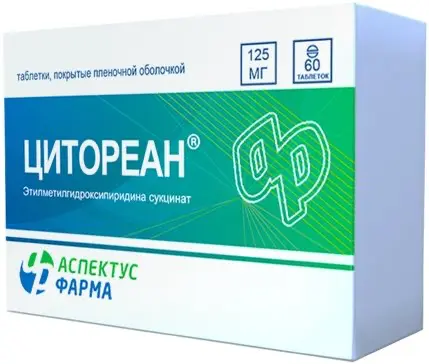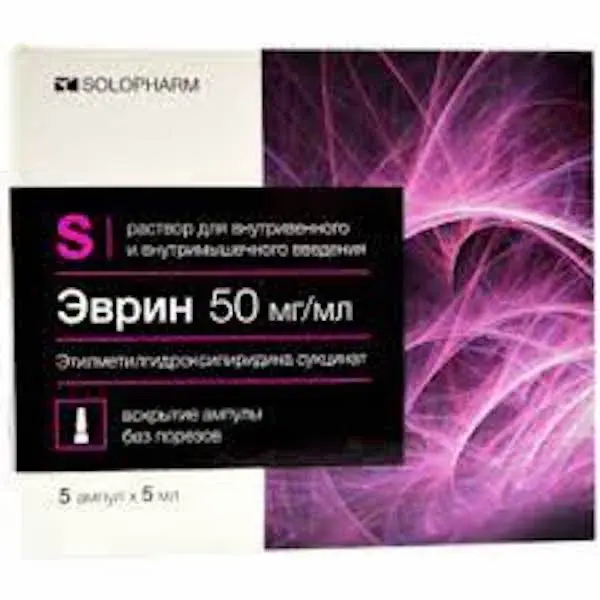Description
Cytorean Pharmacodynamics
Ethylmethylhydroxypyridine succinate is an inhibitor of free radical processes, a membrane protector, which has antihypoxic, stress-protective, nootropic, anticonvulsant and anxiolytic effects. The drug increases the body’s resistance to the effects of various damaging factors (shock, hypoxia and ischemia, cerebral circulation disorders, intoxication with alcohol and antipsychotic drugs (neuroleptics)). It belongs to the class of 3-oxypyridines.
The mechanism of action of ethylmethylhydroxypyridine succinate is due to its antioxidant, antihypoxant and membrane-protective effects. The drug inhibits lipid peroxidation, increases superoxide dismutase activity, increases lipid-protein ratio, improves cell membrane structure and function. Ethylmethylhydroxypyridine succinate modulates the activity of membrane-bound enzymes (calcium-independent phosphodiesterase, adenylate cyclase, acetylcholinesterase), receptor complexes (benzodiazepine, GABA, acetylcholine), which increases their binding ability to ligands, helps maintain the structural and functional organization of biomembranes, transport neurotransmitters and improve synaptic transmission. Ethylmethylhydroxypyridine succinate increases the content of dopamine in the brain. Causes enhancement of compensatory activation of aerobic glycolysis and reduction of the degree of inhibition of oxidative processes in the Krebs cycle under hypoxia with an increase in ATP and creatine phosphate, activation of energy-synthesizing functions of mitochondria, stabilization of cell membranes.
The drug improves metabolism and blood supply to the brain, improves microcirculation and blood rheological properties, reduces platelet aggregation.
Stabilizes membrane structures of blood cells (erythrocytes and platelets) during hemolysis. It has a hypolipidemic effect, reduces the content of total cholesterol and low-density lipoproteins.
Anti-stressor effect is manifested in normalization of post-stress behavior, somatovegetative disorders, restoration of sleep-wake cycles, disturbed learning and memory processes, reduction of dystrophic and morphological changes in various structures of the brain. Ethylmethylhydroxypyridine succinate has a pronounced antitoxic effect in withdrawal syndrome. It eliminates neurological and neurotoxic manifestations of acute alcohol intoxication, restores behavioral disorders, autonomic functions, and is also able to relieve cognitive disorders caused by prolonged ethanol intake and its withdrawal. Under the influence of ethylmethylhydroxypyridine succinate, the effect of tranquilizing, neuroleptic, antidepressant, sleeping pills and anticonvulsants increases, which allows reducing their doses and side effects.
The drug improves functional state of ischemic myocardium. In conditions of coronary insufficiency it increases collateral blood supply of ischemic myocardium, helps to preserve integrity of cardiomyocytes and maintain their functional activity. Effectively restores myocardial contractility in reversible cardiac dysfunction.
- Orally, 125-250 mg 3 times a day with gradual increase until therapeutic effect is achieved; maximum daily dose – 750 mg.
- The duration of treatment is 2-6 weeks. The initial dose is 125-250 mg 1 to 2 times a day with a gradual increase until a therapeutic effect is obtained.
- To treat patients with anxiety disorders, vegetovascular dysfunctions and cognitive disorders, the drug is used for 2-6 weeks.
- To relieve alcohol withdrawal syndrome, the drug is used for 5-7 days.
- The duration of therapy in patients with coronary heart disease is at least 1.5 – 2 months. Repeated courses (as recommended by the doctor), it is desirable to conduct in the spring and autumn periods.
- Course therapy with the drug is completed gradually, reducing the drug dose within 2-3 days.


